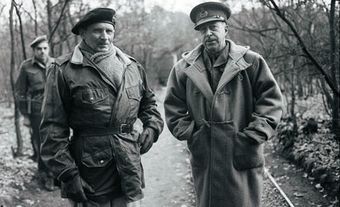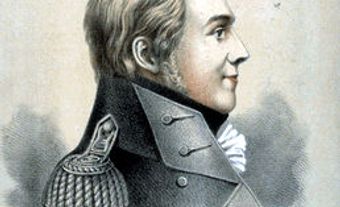Adam Charles Muir, military officer (b at Scotland 1766 or 1770; d at William Henry, Lower Canada, 11 May 1829). Tough and competent, Captain Adam Muir served through a swath of critical battles during the War of 1812, surviving combat, wounds, and capture to outlive the war. Although he was a harsh critic of British commander Major General Henry Procter, Muir's rugged endurance allowed him to persevere through almost the entire war. Muir joined the British army in 1788 in the 41st Regiment of Foot. Well-read and educated, he shot through the ranks quickly, becoming a sergeant after only five months and reaching the rank of lieutenant in 1794. He served first with the regiment in the West Indies and was posted to Montréal in 1799. By 1804, Muir was a captain of his regiment, working hard to make his unit a solid and professional organization. By 1811, Major General Isaac Brock had acknowledged that the potential of Muir's regiment was among the best in the country and sent them to Upper Canada, where they stayed until the outbreak of war with the Americans in 1812.
Adam Muir's Career in the War of 1812
Muir's career in the War of 1812 reads like a road map to the war itself; from conventional firing lines, raids, and sieges, to wounds, defeat and capture, Muir endured it all. At the start of the war he was in command of his regiment's detachment at Amherstburg, where many Aboriginal supporters of Shawnee war chief Tecumseh rallied. The chief led his men in skirmishes against the Americans at the Battle of Brownstown, August 1812. Days later, he and Muir commanded a mix of British and Aboriginal troops at the Battle of Maguaga. After an incorrect bugle call, which some thought was the signal to retreat, Muir reacted decisively, rallying his men against the advancing Americans and denying them their objective of clearing a supply route to Detroit. Muir was wounded at Maguaga, but recovered enough to get back in the fight at the siege of Fort Detroit. His role in the British victory won him a gold medal.
Muir's next major venture was aiding Aboriginal forces to attack Fort Wayne, Indiana, in September. Although their attack began successfully, the approach of fresh American troops convinced Muir and his Aboriginal allies to retreat. Muir then participated in the battles of Frenchtown, Fort Meigs and Fort Stephenson, where he and others began to lose faith in the command talents of their division commander, Major General Henry Procter. Muir purportedly said that Procter "ought to be hanged" for being away from his troops during the worst of the fighting.
At the Battle of the Thames at Moraviantown, Muir and his regiment failed to stem the tide of the Kentucky Riflemen. Muir was captured and incarcerated in Kentucky before a prisoner exchange bought him his freedom a few months later. The harsh life of a POW was recounted by his friend and fellow prisoner John Richardson in his postwar essay, "A Canadian Campaign, by a British officer." In 1814, Muir was promoted to brevet major and took command of militia in the Grand River district of the Niagara Peninsula. The Battle of Malcolm's Mills in November 1814, his last for the war, would end in defeat.
Muir returned to Britain, but misfortune followed. After a crippling fall from a horse in 1816, he returned to Lower Canada, where debt and injury plagued his final years. He retired to a military asylum for invalids and died in 1829, with large debts and grand memories of a career in arms. Sadly, few personal details about Muir were recorded, but it's clear that this tough, capable soldier's contributions to the war were a small but vital part of Britain's victories against the Americans.

 Share on Facebook
Share on Facebook Share on X
Share on X Share by Email
Share by Email Share on Google Classroom
Share on Google Classroom


